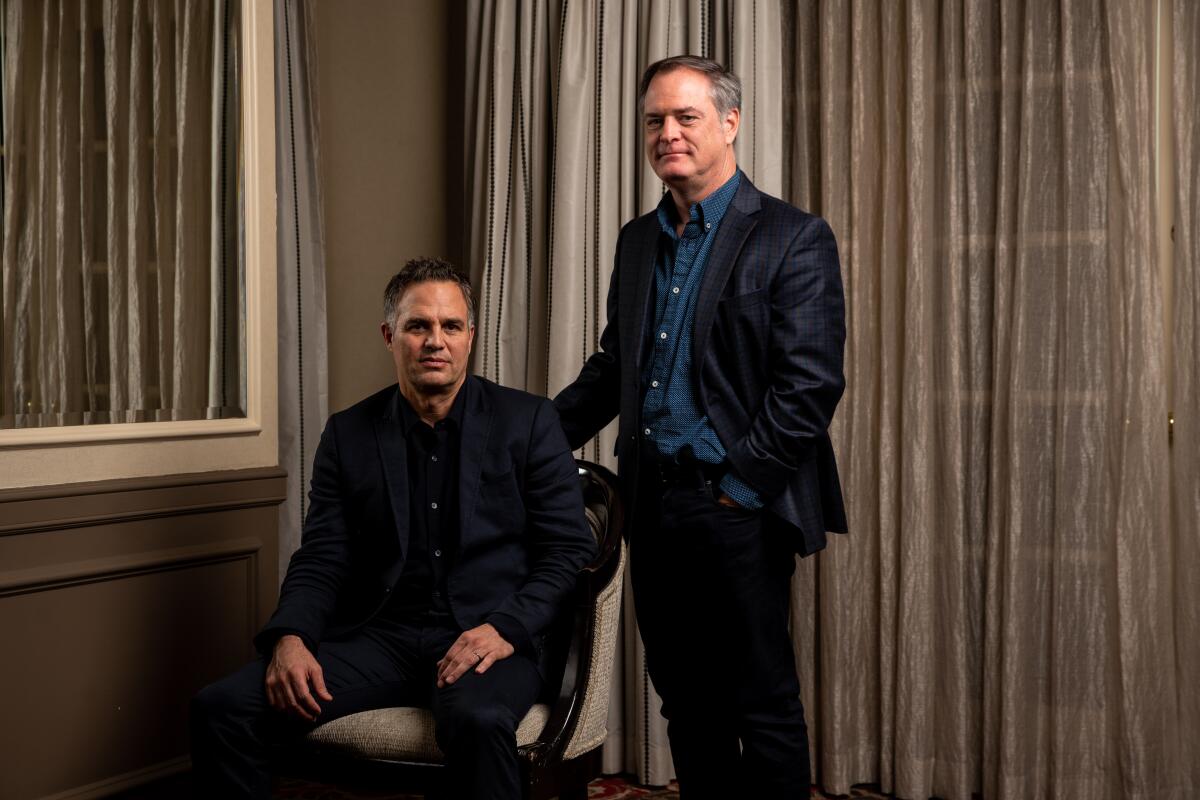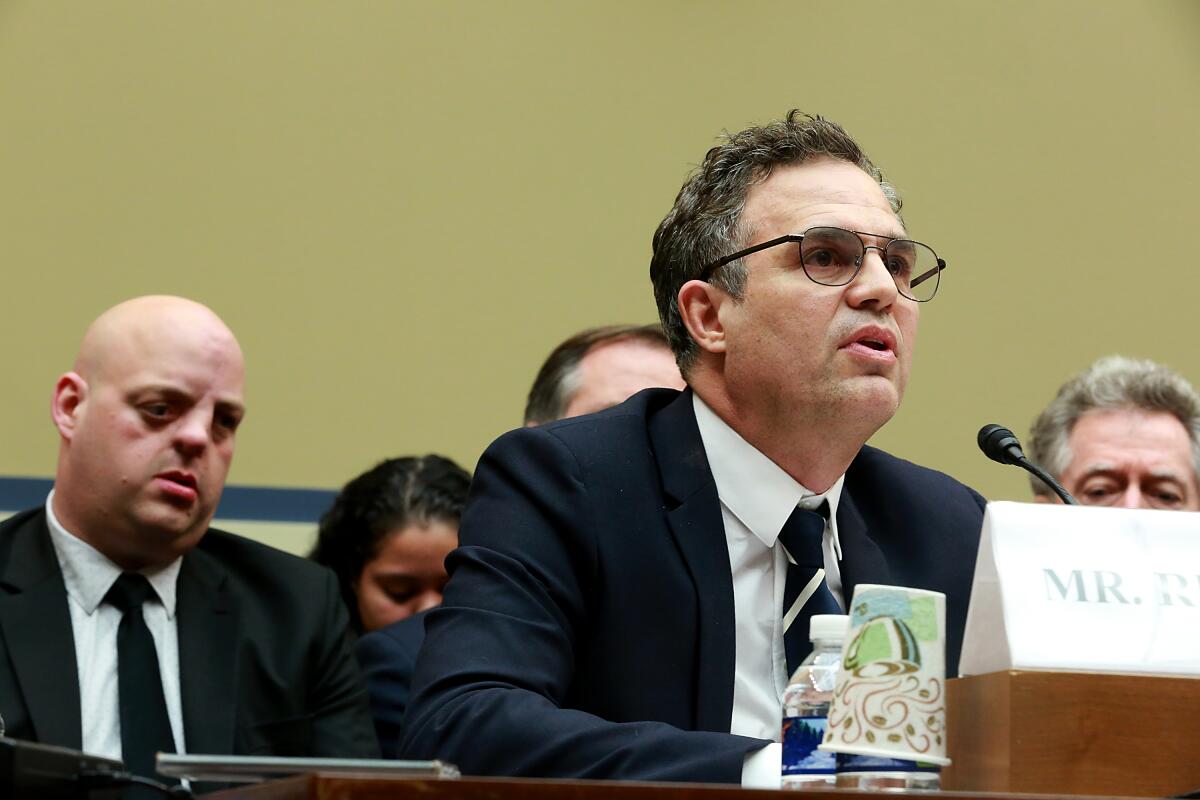How Mark Ruffalo found an outlet for his political passions in ‘Dark Waters’

- Share via
Mark Ruffalo has long been paranoid about his drinking water. The well water at his home, tucked in the Catskill Mountains along the Delaware River, is some of the cleanest in the nation. At his other home in Manhattan, he has a whole house water filtration system.
For the record:
12:47 p.m. Dec. 2, 2019An earlier version of this article said that Mark Ruffalo had a water filtration system in the Catskills, but that system is actually in Manhattan.
He knows the risks, and he can’t ignore them. A decade ago, energy companies threatened to begin natural gas drilling near his 47-acre former dairy farm in New York State. He subsequently became an outspoken environmental activist, arguing that the process of extracting gas via hydraulic fracturing — or hydrofracking — contaminates water with dangerous chemicals.
But until this weekend — with the nationwide release of his new film “Dark Waters” — Ruffalo has kept his politics and his acting career largely separate. In his off time, he shows up at rallies to speak about his antifracking stance and campaigns for Bernie Sanders, whom he supports in part because of the candidate’s belief in the Green New Deal. At work, most of his calendar has been dominated by Marvel. Since 2012, he’s played the Hulk in four films in the comic book universe.
“I love those, and I fit in well there and I enjoy that, but I also — I have more to say,” said Ruffalo. “So finally I was like, ‘Hey, wait a minute. How do I blend this activism that means so much to me into my storytelling?’ It occurred to me: Why don’t I just start producing stuff, so that I’m not waiting for someone to bring this kind of story to me but I’m actually moving it to happen?”
He told his agents that he wanted a project about the environment — maybe a story about climate change, or perhaps one on the clean-water issue. The first thing they brought to him was the 2016 New York Times Magazine article “The Lawyer Who Became DuPont’s Worst Nightmare.” The piece detailed how an Ohio-based corporate attorney named Robert Bilott singlehandedly uncovered how the chemical company had been putting its employees and U.S. communities at risk for decades by exposing them to dangerous pollutants.
As it turned out, Ruffalo had read the story when it was published, and instantly snapped up the rights. But he still had to secure the trust of the article’s subject.
Ruffalo, 52, and Bilott, 54, have deeply contrasting dispositions. Last month, when the two men were scheduled to meet up in Los Angeles, Bilott arrived early with his wife, Sarah, in tow. After gently bidding her farewell, he took a seat in a hotel bar and ordered a Diet Coke. Not one for small talk, he politely began to answer questions about “Dark Waters” until Ruffalo rushed in 10 minutes later, his mouth full of pizza.
“Do you know how hard it is to get him to answer personal questions?” the actor said, immediately jumping into the conversation. “It took a while.”

Ruffalo first connected with Bilott over the phone. It was an unusual situation for the attorney, who had been dutifully working at the venerable Taft Stettinius & Hollister law firm for two decades with little fanfare prior to the Times story. Suddenly, a Hollywood actor wanted to bring his story to life and was attempting to convince him that making a movie about his battle with DuPont could stoke broader public awareness.
“I could tell this wasn’t just a business deal for him — that it was something he really cared about,” said Bilott, whose stern appearance belies a warm demeanor.
“I thought he was interested, but he was tentative. He was discerning,” added Ruffalo.
So the actor flew out to meet Bilott at his home in Cincinnati, and together they made the 3½-hour drive to West Virginia. That’s where Bilott’s fight against DuPont began back in 1998, when he first heard from a farmer in Parkersburg (population 30,096) who was concerned about some suspicious activity on his land.
The farmer, Wilbur Tennant, and his family had sold 66 acres of the cattle farm to DuPont in the early ’80s when they were hard up for cash. In the years since the sale, Tennant’s cows had begun to die off by the dozen — blood was running from their noses, their teeth were blackened and their organs discolored.
Bilott took Tennant’s case, and eventually he would discover that DuPont had dumped over 7,000 tons of toxic sludge on the property. The chemical that made the muck so poisonous was called PFOA — a substance used in the production of nonstick coatings like Teflon. Despite the fact that PFOA is incredibly hard to degrade, Bilott would discover that DuPont had been pumping chemical waste not only onto Tennant’s land but into the Ohio River and digestion ponds near its Parkersburg manufacturing plant. The chemical had contaminated a water source that served over 100,000 people.
Bilott’s research would reveal that even as DuPont was offloading PFOA refuse, the company was aware of the chemical’s potential to negatively affect health. DuPont’s own studies — dating back to 1961 — showed that PFOA caused birth defects in the children of pregnant employees and cancerous liver, pancreatic and testicular tumors in lab animals.
Tennant — who later contracted cancer and died of a heart attack in 2009 — settled with DuPont. But his case would inspire Bilott to file a class-action lawsuit on behalf of all those whose water contained PFOA. In 2017, the company agreed to settle roughly 3,550 personal injury claims for $670.7 million.
In a statement, a DuPont spokesperson stressed that the safety of company employees and the communities in which it operates is of the utmost importance. Further, DuPont argued that “Dark Waters” “misrepresents things that happened years ago” and in some cases “depicts wholly imagined events” in the interest of “seeking to thrill and entertain.”
In Parkersburg, Bilott and Ruffalo were surprised to discover the local allegiance that remains toward the company.
“You still have folks that are die-hard supporters of the company,” noted Bilott. “You had responses like this: ‘We’re all gonna die from something. And so it’s cancer, OK. But at least I had a good job while I lived.’ In other words, ‘It’s OK. We accept you doing this to us because somehow that’s an acceptable price to pay for a job.’ It’s just remarkable that that’s the mindset.”
“The whole thing has so much cynicism in it, and that cynicism comes from a lack of trust in our systems,” Ruffalo said, his voice full of disgust. “We should be able to trust our systems. That’s the agreement we make when we give up some of our power to our government. I’m giving up some of my freedom and some of my power in return for your services and for your keeping me safe. ... We need to come together and say, ‘No, goddammit, not anymore.’ Why do our workers have to make a choice between being poisoned and not having a job? Like, what the [hell] is that? That’s outrageous. But that’s where we are. That’s how sad it’s gotten.”
On set, Ruffalo found he had to temper his natural instincts to play Bilott. His first inclination was to ram through his monologues with self-righteousness. But to stay true to Bilott’s character, he played against that, attempting to remain “dispassionate, lawyerly, factual.”
“To play against the heroism took a lot of discipline for me,” he said. “I’ve spoken at these rallies. I’ve been a rabble rouser. I’ve been righteous. But that wasn’t the nature of this. So I always had to pull back into thoughtfulness and modesty.”

Todd Haynes, who directed “Dark Waters,” was initially fearful that because Bilott wasn’t an Erin Brockovich type, his story might not interest audiences.
“He doesn’t have tremendous charisma or humor or quick-wittedness,” the filmmaker admitted. “But that offered dramatic potential, because Rob is an unlikely hero — a guarded, restrained, emotionally blocked character who doesn’t think to be suspicious about information. Mark and I both immediately realized this was a tremendous, exciting challenge — making the audience interested in watching somebody who is ill-prepared for what he is about to take on and watching him change.”
Ruffalo asked Haynes if Bilott could be on set — especially because much of the movie was actually filmed in the Taft offices. At first, the filmmaker was reluctant, fearing he might prove to be a distraction for the actor. Instead, Bilott turned out to be an invaluable resource for the production, offering tips on banal details — How many legal pads did you stack on your desk? What would be on the table during a deposition? — as well as emotional motivation.
“Listen, there is a part of you that’s like, ‘Oh, no, he’s watching. He is going to think I’m [messing] this up,’” Ruffalo acknowledged. ”But on a higher level, this is your source material. If he doesn’t think it’s right, then what’s wrong with that? All I’m doing is protecting my ego here, really.”
One night, after shooting wrapped for the day, Ruffalo went home to prepare for a big scene in which Bilott deposes DuPont’s CEO. His first instinct, he told the lawyer, was to “eat the guy alive” — tearing into him about all the damage the company had inflicted. But Bilott insisted that hadn’t been his motivation at all.
“I was telling Mark that I was trying to remain very calm,” said the lawyer. “The only way to get through to this guy was to be professional: ‘Here are the facts.’ Connect with him and say: ‘You see this?’ My concern was that I would lose him if he thought I was just another loud, obnoxious plaintiff’s lawyer. I wanted to show him everything that was there in hopes that he would get it at the end. And at the end of that deposition, he walked up, extended his hand and said, ‘Thank you.’ And I looked at him and I really thought he was honestly thanking me.”
That’s what has kept Bilott driving ahead for so many years — his belief that if the public just has the information, they’ll do the right thing. Participant Media, which produced “Dark Waters,” is spearheading an educational campaign alongside the film’s release so that consumers can learn about products such as cookware, makeup and stain-resistant carpeting that still contain PFOA and other “forever chemicals.”
And DuPont is bracing for negative impact. On an Oct. 31 earnings call, top executives were asked about the film, to which Executive Chairman Ed Breen replied that the movie “is not true facts” and said DuPont was “doing some things for employees and all that so that they understand facts and all that.” CEO Marc Doyle followed up by telling investors that the company did not plan to “fight it out in the public eye” with the film because that would “just drive more and more attention to it.”
“It’s certainly not the company that any of us know,” continued Doyle. “I’ve been with DuPont for 25 years myself. ... The behaviors that you might see in there are certainly not the behaviors that I witnessed at any point in my career.”
Complicating the controversy is the fact that in 2015, DuPont spun off the division that makes forever chemicals into a new company called Chemours. And Chemours — which did not respond to a request for comment — is currently suing DuPont in a suit pending before a Delaware court, claiming that DuPont knowingly created the new entity “as part of a plan to try to off-load its historical environmental liabilities.”
The lawsuit alleges that DuPont downplayed “potential maximum liabilities,” noting that in 2015, DuPont estimated the legal claims filed by Bilott on behalf of 3,500 West Virginians whose water had been poisoned would cost the company no more than $128 million. Two years later, DuPont and Chemours said they would settle the cases for over five times that sum.
Indeed, in its statement, DuPont pointed out that it “does not make the chemicals in question” and said it backs “federal legislation and science-based regulatory efforts to address these chemicals.” Because of the Chemours spinoff, however, Bilott believes such arguments are deceitful.
“It’s very misleading to have DuPont now appearing before Congress saying, ‘We support regulation of these chemicals,’” the lawyer said. “That is not the old DuPont. But to the public, it’s as if DuPont is doing all these great things now. It’s not the same company.”
It’s a lot to wade through, to be sure. But Christine Vachon, who produced “Dark Waters,” is hopeful that filmgoers will look past “more bad news” and be inspired by Bilott’s example.
“In this time when we’re being subsumed with this sense of ‘It’s every man for himself,’ the idea that somebody really says, ‘I’m gonna step outside of my comfort zone to take care of somebody else’ restores your faith in some kind of humanity,” said Vachon.
For Ruffalo, the film has proved similarly motivating. As a young actor, he studied with Stella Adler — an instructor he described as politically minded, someone who saw a performer’s role as pushing the culture forward. The idea that he carries a social responsibility has stuck with him ever since.
“These kind of stories move me because they are important stories that people need to have and hold on to to feel that life isn’t just a miserable, cynical experience,” Ruffalo said. “There are people like Rob. That is a path that you can take. People aren’t just purely selfish and self-serving, you know? Especially now in this moment when America is being Putin-ized. We’re being led to believe that everything is [crap], that no one can really lift up above that, that selfishness is the ultimate reality. And we’re here to say there’s an alternative to that: the truth.”
More to Read
Only good movies
Get the Indie Focus newsletter, Mark Olsen's weekly guide to the world of cinema.
You may occasionally receive promotional content from the Los Angeles Times.











